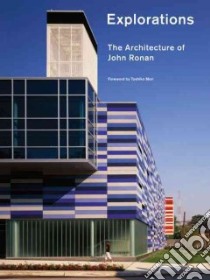Explorations - 9781568988764
Un libro in lingua di Mori Toshiko (FRW) edito da Chronicle Books Llc, 2010
- € 30.70
- Il prezzo è variabile in funzione del cambio della valuta d’origine
In Chicago, there is a long history of celebrating architecture as a building art—not merely a graphic one—where lofty rhetoric takes a back seat to clear-headed pragmatism. John Ronan is a leading figure of a new generation of architects that are not only steeped in the grounded, rigorous, and self-critical Chicago tradition, but are also focused on design innovation. Ronan's decade-old practice has garnered critical praise and awards inrecognition of its subtle integration of sustainable technology, spatial composition, and material detail. His beautifully simple spaces convey a recurring theme of adaptability and flexibility across multiple functions that, when activated by a specific use, do not deter from a holistic architectural intent. Explorations features twelve projects ranging in scale from private residences and adaptive renovations to large public buildings.
John Ronan Architects' award-winning Gary Comer Youth Center was designed specifically to support the activitiesof Chicago's South Shore Drill Team; however, during the design process, the function of the space continued to evolve along with the client's goals, resulting in an architectural program that grew from a simple gym into a multifunctional space supporting a range of community and educational services. Explorations also features fully documented design processes for the recently completed Poetry Foundation in Chicago; the transformation of Washington, D.C.'s historic Yale Steam Laundry building into condominiums; the Urban Model High School, a new prototype school developed for the Public Building Commission of Chicago; and Precast Chapel, an economical concrete chapel for promoting interfaith dialogue and religious understanding. Explorations features a foreword by architectect Toshiko Mori; an essay by highly respected Chicago-based architect Brad Lynch; and an interview with John Ronan conducted by architectural historian Robert McAnulty.
Informazioni bibliografiche
- Titolo del Libro in lingua: Explorations
- Sottotitolo: The Architecture of John Ronan
- Lingua: English
- Autore: Mori Toshiko (FRW)
- Editore: Chronicle Books Llc
- Collana: Chronicle Books Llc (Paperback)
- Data di Pubblicazione: 03 Marzo '10
- Genere: ARCHITECTURE
- Argomenti : Architecture United States History 20th century Architecture United States History 21st century
- Pagine: 192
- ISBN-10: 1568988761
- EAN-13: 9781568988764


